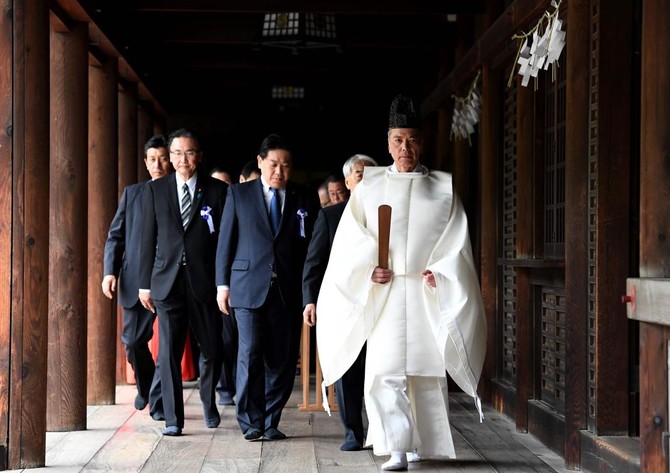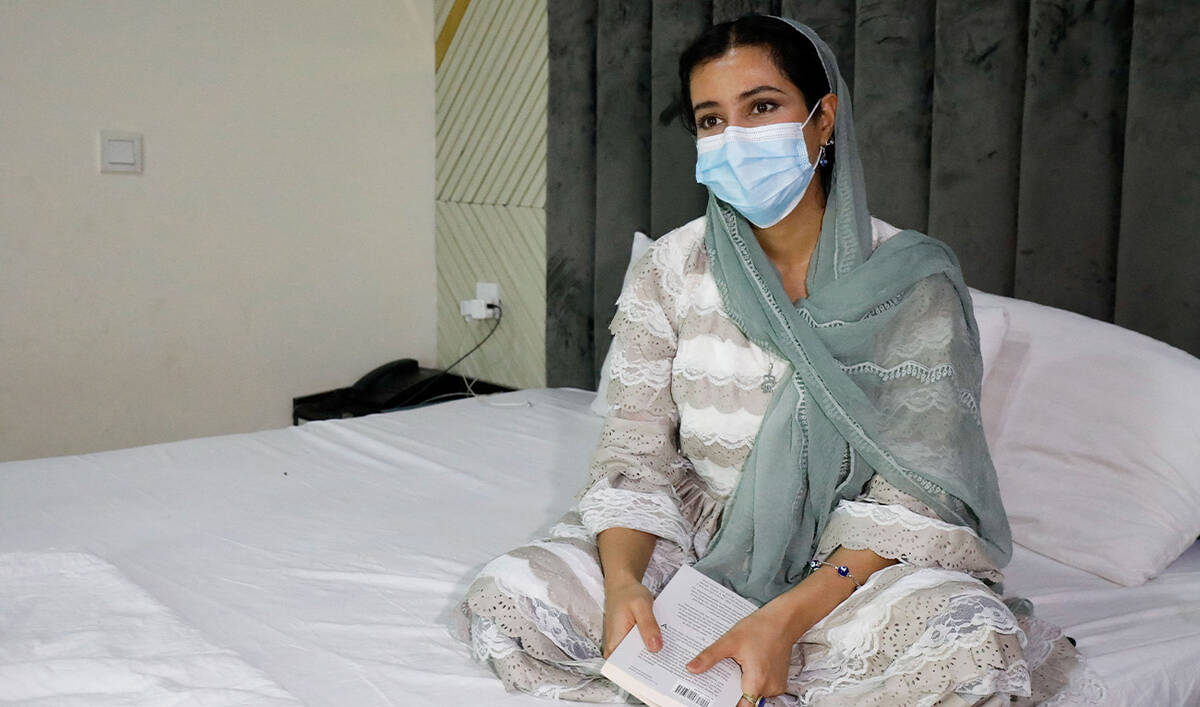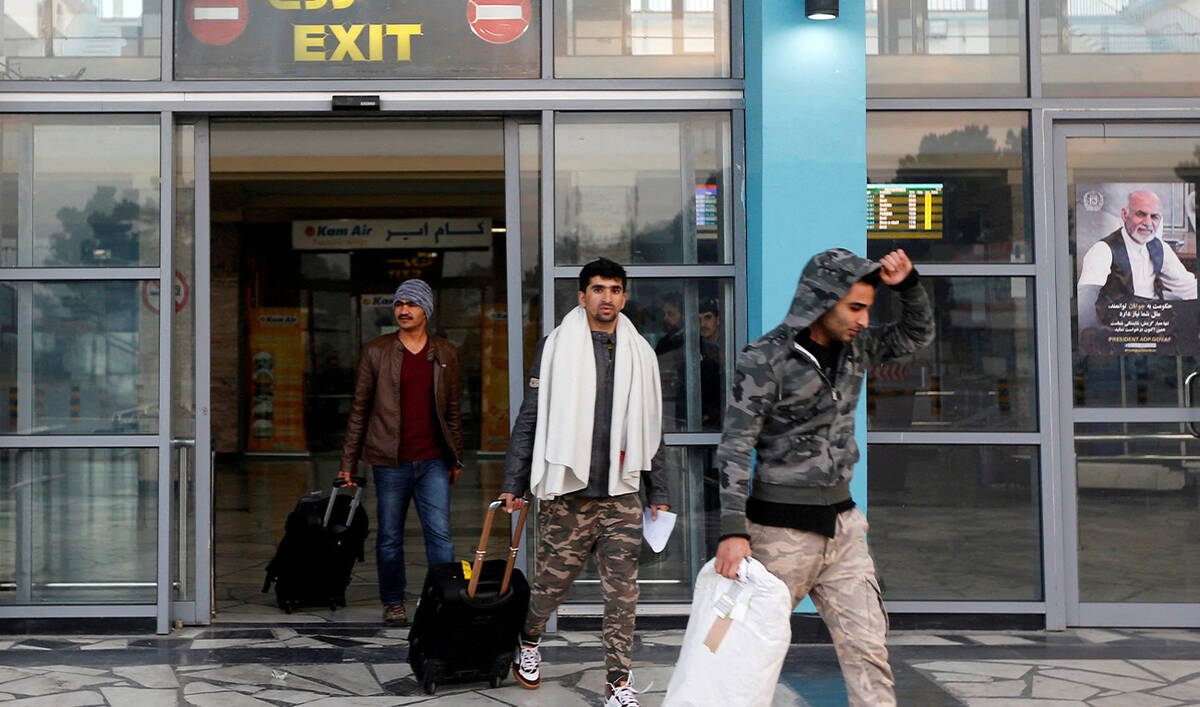TOKYO: Dozens of Japanese lawmakers, including a government minister, visited a controversial war shrine on Friday, drawing protests from China and South Korea which see it as a painful reminder of Tokyo’s aggressive past.
Yasukuni Shrine honors millions of mostly Japanese war dead, but is contentious for also enshrining senior World War II military and political figures convicted of war crimes by an international tribunal.
Internal Affairs Minister Sanae Takaichi and 95 other members of parliament visited the Shinto religious facility in central Tokyo to mark the start of a three-day spring festival — roughly the same as last year’s figure.
Lawmakers, mostly conservative, say the pilgrimages are a chance to console the spirits of the dead and pray for peace. But North and South Korea and China consider them painful reminders of Japanese colonialism and invasion during the early 20th century.
Prime Minister Shinzo Abe, who wants Tokyo, Beijing and Seoul to cooperate in countering the growing security threat from Pyongyang, did not visit the shrine but sent an offering in the form of a sacred tree.
South Korea’s foreign ministry said the visits and offerings were “deeply worrying and regrettable” while China’s foreign ministry spokesman Lu Kang said Tokyo should “face up to” its “history of aggression.”
Abe has avoided the shrine since going in 2013. That visit sparked fury in Beijing and Seoul and even earned a diplomatic rebuke from close ally the United States.
Japan lawmakers visit controversial war shrine
Japan lawmakers visit controversial war shrine

Rashid Khan’s star continues to shine

- The 26-year-old bowler’s meteoric rise to prominence has contributed to outstanding performances by the Afghan national men’s team
Rashid Khan is a cricketing superstar who will play for the Oval Invincibles in The Hundred this summer. Before joining the team, he added brand ambassadorship to his cricketing prowess — on July 3 in Dubai, he was revealed as the face of leading real estate company, MH Developers.
This exemplifies the opportunities for sponsorship and brand endorsement now available to top cricketers and is a far cry from some 70 years ago when the best they could hope for was their signature on the face of a bat.
Khan’s cricketing rise to prominence has been meteoric and has contributed to outstanding performances by the Afghan national men’s team, which included reaching the 2024 T20 World Cup semi-final.
This is even more remarkable given that the team is effectively in exile. At least it gets to play, unlike the women’s team; most of those players fled the country in fear of their lives and many are now in Australia, desperate to play cricket. They have lobbied the International Cricket Council about their plight, but the ICC, along with much of the international cricketing community, has been tight-lipped about expressing support or making proposals to alleviate the situation.
Their male counterparts have been more fortunate. A contributory factor has been the UAE, with Khan quick to recognize that it “has been like a spiritual home for Afghan cricket for many years, providing a safe haven and platform amid the challenges back home.”
Hence, the collaboration with MH Developers holds tremendous significance for him personally and professionally, having experienced an itinerant lifestyle shuttling between the eastern border of Afghanistan and Pakistan.
In the early 2000s, Khan’s family, which owned a tire business, left war-torn Afghanistan for Pakistan. Rashid was the sixth of 11 brothers and competed with them in tape-ball cricket — a tennis ball wrapped in electrical tape — which is played on concrete strips in corridors. In order to achieve greater zip off the surface, he developed his characteristic fast-arm action and ability to flip the ball out of his fingers to spin and flight his leg breaks sharply.
This, coupled with his batting abilities, marked him out to experienced observers, including coaches at the Islamia College in Peshawar where he studied computer science until 2013. When the Afghan team toured Pakistan in 2014 he performed outstandingly in Peshawar. It was on Dec. 7, 2016, that he made his debut for Afghanistan against the England Lions in Abu Dhabi, taking 4 for 48 and 8 for 74, along with 25 not out and 52, a rich return for one so young. The path was set.
Currently, Khan captains Afghanistan’s T20 men’s team. He has also captained the Test and One Day International teams. In March 2018, aged 19 years and 165 days, he became the youngest player to captain an international side. Then in September 2019, aged 20 years and 350 days, he became the youngest person to captain a Test match team, leading Afghanistan against Bangladesh. He also played in Afghanistan's first Test match against India in June 2018.
Prior to that, in February 2018, he became the youngest player to top the ICC Player rankings for bowlers in ODIs. He immediately followed that by topping the ICC T20I bowler rankings, where he is currently number nine; he is also number five in the ODI bowler rankings and seventh in the ODI all-rounder rankings, having once been number one.
Along the way, he became the fastest and youngest bowler to take 100 wickets in ODIs, needing only 44 matches; the previous record was 52. In June 2018, he reached 50 wickets in T20Is in two years and 220 days, the fastest bowler to achieve this feat. This was followed in October 2021 when he became the fastest bowler in terms of matches, his 53rd, to claim 100 wickets in T20Is. Currently he has taken 161 T20I wickets, the second highest number, and is likely to regain top place.
It is therefore no surprise he has been in demand around the franchise circuit. His teams have included the Sunrisers Hyderabad and the Gujarat Titans in the Indian Premier League, Adelaide Strikers in Australia’s Big Bash League, MI New York in the USA’s Major League Cricket, Quetta Gladiators and Lahore Qalanders in the Pakistan Super League, the Guyana Amazon Warriors and the Barbados Tridents, for whom he took the first hat-trick in the history of the Caribbean Premier League. Khan did play in the only edition so far of the Afghanistan Premier League, in 2018. This was for Kabul Zwanan, who were beaten by Balkh Legends in the final at Sharjah. Despite this, Rashid Khan was the player of the tournament.
It is easy to forget that Khan is still only 26, having made his full international debut on Oct. 18, 2015, in an ODI match against Zimbabwe in the UAE. His T20I international debut followed a week later. He has crammed a lot of professional cricket into the past 10 years.
Khan, who graciously gave a “big thank you to Trent Rockets for the three seasons I spent at Trent Bridge,” says he is “really excited to be joining Oval Invincibles and calling the Kia Oval my home this August. It’s great to be joining the back-to-back champions; hopefully, I can contribute to more success this season.”
The first match at the Oval will be on Aug. 9 against the Manchester Originals. Khan’s move is also an indication of the reality of global franchises — he has played in New York for the Mumbai Indians, who now own 49 percent of the Invincibles.
Khan’s cricket career has been on a consistently upwards path. His brand ambassadorship coincides with a time when Dubai’s real estate market is witnessing a significant upward trend. First-half 2025 figures show a 15 percent year-on-year increase in average property prices and a 20 percent surge in transaction volumes. MH Developers is looking to engage with a wider audience and strengthen their foothold in this thriving market. The global sporting reputation of Rashid Khan, the focus, commitment and talent identified by his first coaches, will be an integral part of this strategy.
Rashid Khan’s legacy in international cricket is already assured but there should be more chapters for him to write.
After The Hundred, there is the prospect of the six-team Asia Cup. Since the recent hostilities between India and Pakistan, the tournament has been in doubt. There is now renewed optimism for it taking place, though the location is uncertain.
It was originally due to be hosted by India. Under new arrangements, whenever it is India or Pakistan’s turn to host the tournament, a neutral venue will be chosen. Afghanistan is a non-starter, which leaves Bangladesh, Sri Lanka — where the monsoon season is due — and the UAE.
If the latter is chosen, there could be some instant returns on Rashid Khan’s brand ambassadorship.
UN expert urges states to cut Israel trade ties over ‘apocalyptic’ Gaza situation

In a speech to the UN Human Rights Council, UN Special Rapporteur on the Occupied Palestinian Territories Francesca Albanese said: “The situation in the occupied Palestinian territory is apocalyptic.”
“Israel is responsible for one of the cruellest genocides in modern history,” she added, in a speech that was met with a burst of applause from the Geneva council.
Israel’s diplomatic mission in Geneva did not immediately respond to a request for comment on Albanese’s speech.
Israel has rejected accusations of genocide in Gaza, citing its right to self-defense following the deadly October 7, 2023, Hamas attack. Its delegate was not present in the room in line with a new policy to disengage with the council which Israel says has an antisemitic bias.
Albanese, one of dozens of independent UN-mandated experts to document abuses around the world, was presenting her latest report which named over 60 companies she said were involved in supporting Israeli settlements and military actions in Gaza.
“What I expose is not a list, it is a system, and that is to be addressed,” she told the council.
“We must reverse the tide,” she added, calling for states to impose a full arms embargo, suspend all trade agreements and ensure companies face legal consequences for their involvement in violations of international law.
Israel’s diplomatic mission in Geneva earlier this week said Albanese’s latest report was “legally groundless, defamatory and a flagrant abuse of her office.”
Saudi Arabia’s POS spending climbs 24.4% to $3.6bn in final week of June

RIYADH: Saudi Arabia’s point-of-sale transactions climbed to SR13.6 billion ($3.6 billion) in the week ending June 28, marking a 24.4 percent rise compared to the previous seven-day period, according to the latest official figures.
The point-of-sale transactions bulletin issued by the Saudi Central Bank showed that the number of transactions also rose by 8.6 percent to reach 219.9 million.
Spending on recreation and culture posted the highest weekly increase, surging 49.3 percent to reach SR294.7 million. The number of transactions in this category rose slightly to 2.26 million.
Clothing and footwear followed with a 44.2 percent surge in spending, totaling SR830.9 million. The number of transactions in this section rose 34.5 percent to 6.2 million.
Telecommunications came third, with a 38.7 percent increase in value to SR123.9 million and a rise in transactions to just over 2 million.
Spending on public utilities increased by 28.8 percent, reaching SR52.3 million through 690,000 transactions.
Gas stations registered SR963.5 million in transactions, up 18.4 percent from the prior week. Transaction volume climbed to 17.2 million.
Expenditures in the health sector reached SR840 million, an increase of 17.9 percent, while spending on transportation rose 18.7 percent to SR746 million. The number of transportation transactions hit 2.9 million.
Jewelry sales rose by 34.7 percent to reach SR352.7 million from 280,000 sales.
Education services recorded sales of SR 212.1 million, up 9.7 percent, with the number of transactions in the sector reached 118,000.
Sales at hotels reached SR212.5 million, a 28.3 percent weekly increase, while transactions advanced 26.4 percent to 680,000.
Spending on construction and building materials totaled SR328 million, representing a 7.9 percent boost from the previous week. The number of transactions stood at 1.7 million.
Among cities, Hail recorded the highest increase in POS transaction value, rising 41.5 percent to SR226.2 million across 4 million transactions.
Abha followed with a 37.6 percent rise in spending, totaling SR195.3 million from 3.48 million transactions.
Additional cities across the Kingdom contributed SR3.93 billion in POS sales, reflecting a 32.6 percent increase from the previous week.
Madinah posted SR516 million in transactions, up 27.7 percent, while Jeddah recorded SR1.93 billion, marking a 20.4 percent increase.
Makkah followed with SR471.7 million, up 20.2 percent from the prior week.
Riyadh remained the highest in overall value with SR4.68 billion in sales, a 19.7 percent weekly rise, and 70.3 million transactions.
Dammam registered SR673.3 million, increasing 18.1 percent.
Khobar and Buraidah posted SR385.7 million and SR327.7 million, respectively, while Tabuk reported SR278.5 million in POS spending.
PM: Ethiopia’s mega dam on the Nile ‘now complete’

- Prime Minister Abiy said the dam has been a source of tension with neighbors, notably Egypt
ADDIS ABABA: Ethiopia’s Prime Minister Abiy Ahmed on Thursday said that a contentious multi-billion-dollar mega-dam on the Blue Nile is now complete and set to be officially inaugurated in September.
“The Grand Ethiopian Renaissance Dam is now complete, and we are preparing for its official inauguration,” Abiy told parliament of the dam that has been a source of tension with neighbors, notably Egypt.
Afghan refugees stuck in Pakistan as Germany halts entry program

- Berlin halts at-risk Afghan resettlement as political shift curbs migration pathways
- Over 2,400 Afghans await entry as suspended admission program under review
BERLIN/ISLAMABAD, July 3 : In a cramped guesthouse in Pakistan’s capital, 25-year-old Kimia spends her days sketching women — dancing, playing, resisting — in a notebook that holds what’s left of her hopes.
A visual artist and women’s rights advocate, she fled Afghanistan in 2024 after being accepted on to a German humanitarian admission program aimed at Afghans considered at risk under the Taliban.
A year later, Kimia is stuck in limbo.
Thousands of kilometers away in Germany, an election in February where migration dominated public debate and a change of government in May resulted in the gradual suspension of the program.
Now the new center-right coalition intends to close it.
The situation echoes that of nearly 1,660 Afghans cleared to settle in the United States, but who then found themselves in limbo in January after US President Donald Trump took office and suspended refugee programs.
Kimia’s interview at the German embassy which she hoped would result in a flight to the country and the right to live there, was abruptly canceled in April.
Meanwhile, Germany pays for her room, meals and medical care in Islamabad.
“All my life comes down to this interview,” she told Reuters. She gave only her artist name for fear of reprisal.
“We just want to find a place that is calm and safe,” she said of herself and the other women at the guesthouse.

The admission program began in October 2022, intending to bring up to 1,000 Afghans per month to Germany who were deemed at risk because of their work in human rights, justice, politics or education, or due to their gender, religion or sexual orientation.
However, fewer than 1,600 arrived in over two years due to holdups and the cancelation of flights.
Today, around 2,400 Afghans are waiting to travel to Germany, the German foreign ministry said. Whether they will is unclear. NGOs say 17,000 more are in the early stages of selection and application under the now dormant scheme.
The foreign ministry said entry to Germany through the program was suspended pending a government review, and the government will continue to care for and house those already in the program.
It did not answer Reuters’ questions on the number of canceled interviews, or how long the suspension would last.
Reuters spoke with eight Afghans living in Pakistan and Germany, migration lawyers and advocacy groups, who described the fate of the program as part of a broader curb on Afghan asylum claims in Germany and an assumption that Sunni men in particular are not at risk under the Taliban.
The German government says there is no specific policy of reducing the number of Afghan migrants. However, approval rates for Afghan asylum applicants dropped to 52 percent in early 2025, down from 74 percent in 2024, according to the Federal Migration Office (BAMF).
POLITICAL SHIFT
Kabul fell to the Taliban in August 2021. Since May 2021 Germany has admitted about 36,500 vulnerable Afghans by various pathways including former local staff, the government said.
Thorsten Frei, chief of staff to Germany’s new chancellor Friedrich Merz, said humanitarian migration has now reached levels that “exceed the integration capacity of society.”
“As long as we have irregular and illegal migration to Germany, we simply cannot implement voluntary admission programs.”

The interior ministry said programs like the one for Afghans will be phased out and they are reviewing how to do so.
|Several Afghans are suing the government over the suspension. Matthias Lehnert, a lawyer representing them, said Germany could not simply suspend their admissions without certain conditions such as the person no longer being at risk.
Since former chancellor Angela Merkel opened Germany’s borders in 2015 to over a million refugees, public sentiment has shifted, partly as a result of several deadly attacks by asylum seekers. The far-right Alternative for Germany party (AfD), capitalizing on the anti-migrant sentiment, surged to a historic second-place finish in February’s election.
Afghans Reuters spoke with said they feared they were being unfairly associated with the perpetrators, and this was putting their own lives at risk if they had to return to Afghanistan.
“I’m so sorry about those people who are injured or killed ... but it’s not our fault,” Kimia said.
Afghan Mohammad Mojib Razayee, 30, flew to Germany from Cyprus in March under a European Union voluntary solidarity mechanism, after a year of waiting with 100 other refugees. He said he was at risk after criticizing the Taliban. Two weeks after seeking asylum in Berlin, his application was rejected.
He was shocked at the ruling. BAMF found no special protection needs in his case, a spokesperson said.
“It’s absurd — but not surprising. The decision-making process is simply about luck, good or bad,” said Nicolas Chevreux, a legal adviser with AWO counseling center in Berlin.
Chevreux said he believes Afghan asylum cases have been handled differently since mid-2024, after a mass stabbing at a rally in the city of Mannheim, in which six people were injured and a police officer was killed. An Afghan asylum seeker was charged and is awaiting trial.

‘YOU DON’T LIVE’
Spending most days in her room, surrounded by English and German textbooks, Kimia says returning to Afghanistan is unthinkable. Her art could make her a target.
“If I go back, I can’t follow my dreams — I can’t work, I can’t study. It’s like you just breathe, but you don’t live.”
Under Taliban rule, women are banned from most public life, face harassment by morality police if unaccompanied by a male guardian, and must follow strict dress codes, including face coverings. When security forces raided homes, Kimia said, she would frantically hide her artwork.
The Taliban say they respect women’s rights in accordance with their interpretation of Islamic law and local culture and that they are not targeting former foes.
Hasseina, is a 35-year-old journalist and women’s rights activist from Kabul who fled to Pakistan and was accepted as an applicant on to the German program.
Divorced and under threat from both the Taliban and her ex-husband’s family, who she says have threatened to kill her and take her daughter, she said returning is not an option.
The women are particularly alarmed as Pakistan is intensifying efforts to forcibly return Afghans. The country says its crackdown targets all undocumented foreigners for security reasons. Pakistan’s foreign ministry did not respond to request for comment on how this affects Afghans awaiting German approval.
The German foreign ministry has said it is aware of two families promised admission to Germany who were detained for deportation, and it was working with Pakistan authorities to stop this.
Marina, 25, fled Afghanistan after being separated from her family. Her mother, a human rights lawyer, was able to get to Germany. Marina has been waiting in Pakistan to follow her for nearly two years with her baby.
“My life is stuck, I want to go to Germany, I want to work, I want to contribute. Here I am feeling so useless,” she said.















